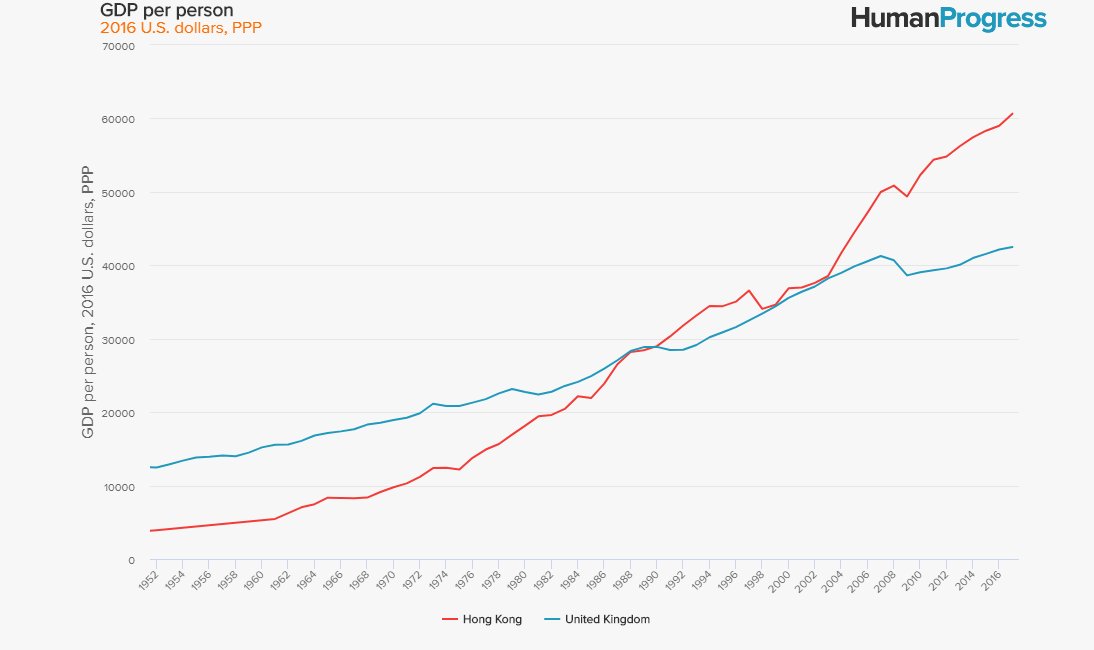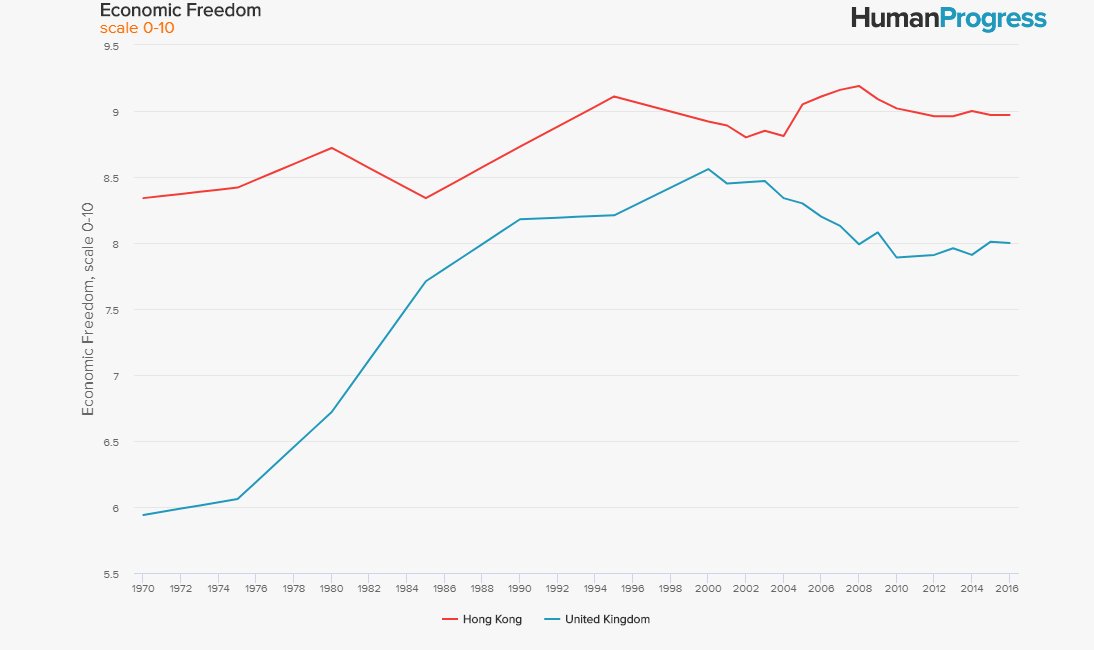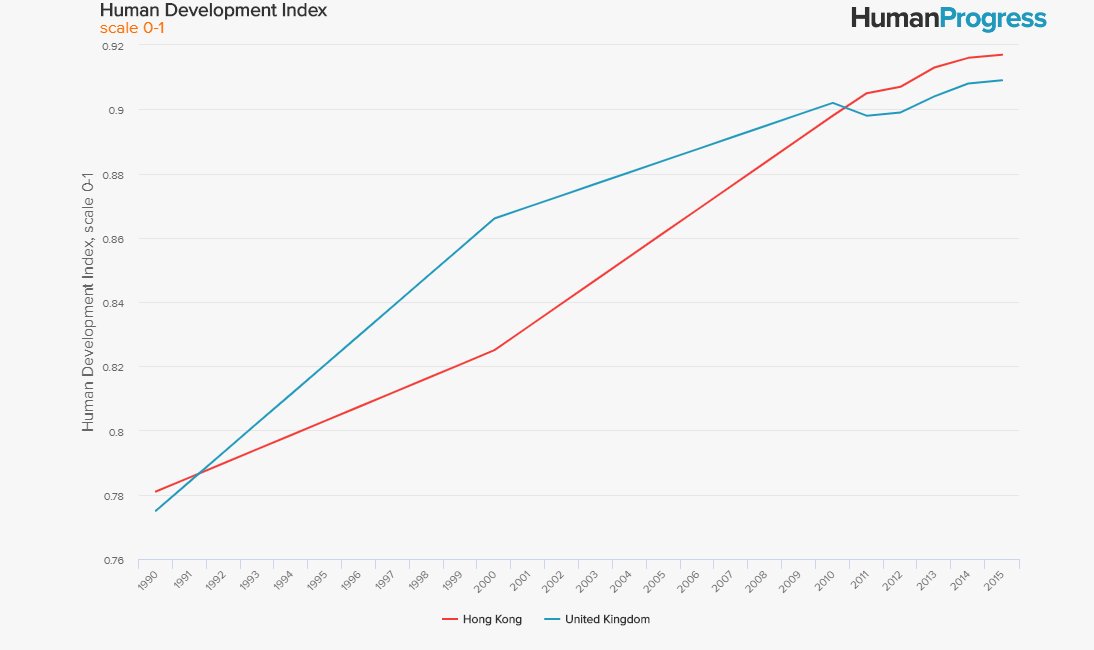
April 1st marks the beginning of #78DaysOfProgress, a thread that will outline seventy-eight different ways the world is getting better. 🌍📈
If you can't wait that long, you can check out all 78 trends in our bestselling book:
tenglobaltrends.org
If you can't wait that long, you can check out all 78 trends in our bestselling book:
tenglobaltrends.org
💉Humanity is getting better and better at developing vaccines.
Compare the historical pace of progress with our response time to the COVID-19 pandemic.
Read more about this trend in our book: tenglobaltrends.org
#78DaysOfProgress
(1/78)
Compare the historical pace of progress with our response time to the COVID-19 pandemic.
Read more about this trend in our book: tenglobaltrends.org
#78DaysOfProgress
(1/78)
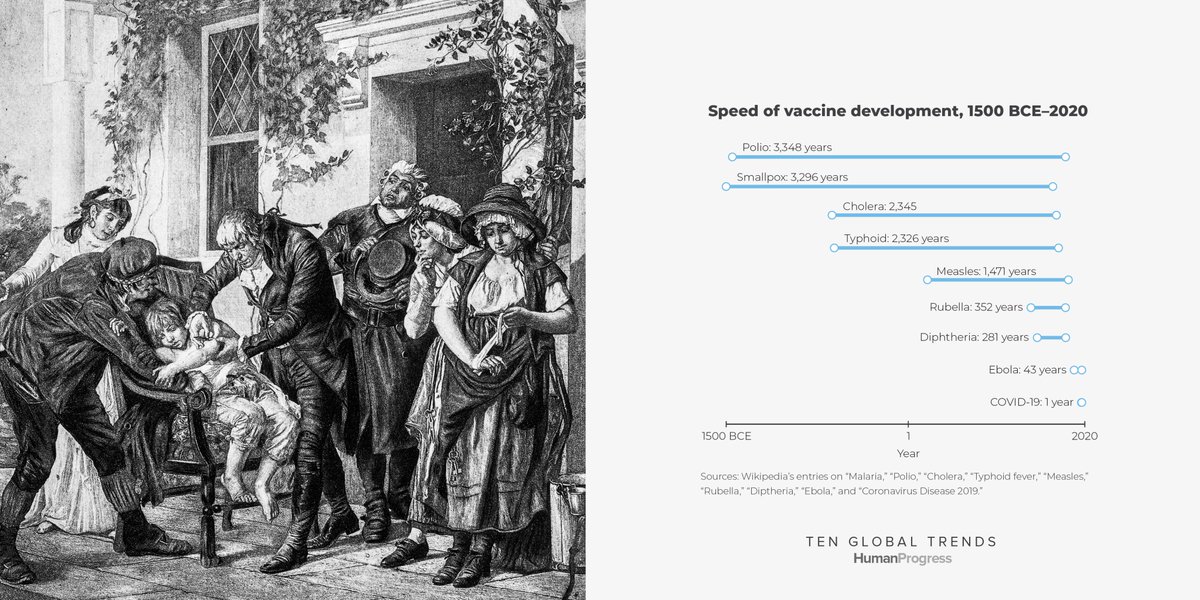
💸Global inequality has started to decline–primarily due to faster growth in non-Western countries.
Read more about this trend in our book: tenglobaltrends.org
#78DaysOfProgress
(2/78)
Read more about this trend in our book: tenglobaltrends.org
#78DaysOfProgress
(2/78)
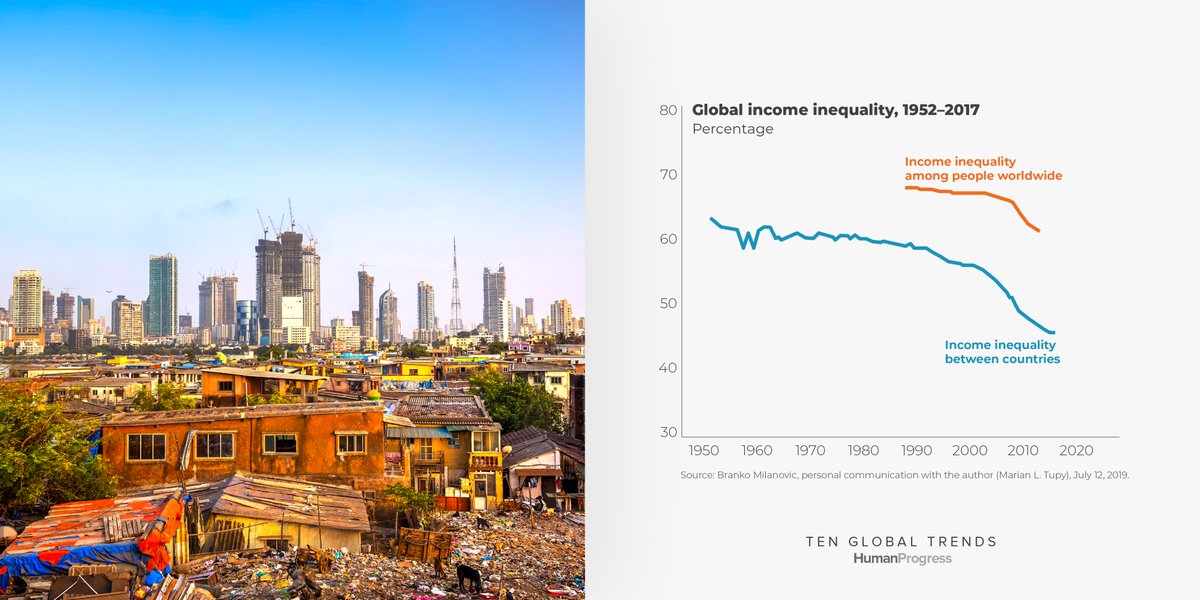
🧑⚖️The global homicide rate fell 17% between 1990 and 2017 as the rule of law, fairer judicial systems, and better policing spread to more countries around the world.
Read more about this trend in our book: tenglobaltrends.org
#78DaysOfProgress
(3/78)
Read more about this trend in our book: tenglobaltrends.org
#78DaysOfProgress
(3/78)

⚙️ CO2 emissions per dollar of GDP have fallen as businesses reduce their energy costs.
Absolute CO2 emissions have yet to fall outside of economic recessions, but emission efficiency is a step in the right direction.
Read more: tenglobaltrends.org
#78DaysOfProgress
(4/78)
Absolute CO2 emissions have yet to fall outside of economic recessions, but emission efficiency is a step in the right direction.
Read more: tenglobaltrends.org
#78DaysOfProgress
(4/78)

🪖 The global battle death rate fell 95% between 1953 and 2016.
Some scholars attribute this trend to TV news, arguing that seeing the horrors of war on-screen made us much more sensitive to war casualties.
Read more: tenglobaltrends.org
#78DaysOfProgress
(5/78)
Some scholars attribute this trend to TV news, arguing that seeing the horrors of war on-screen made us much more sensitive to war casualties.
Read more: tenglobaltrends.org
#78DaysOfProgress
(5/78)

🏙️The OECD estimates that 85% of the world’s population will be urbanized by 2100.
That's great news. Cities lead to growth and innovation and are good for the environment.
Read more in our book: tenglobaltrends.org
#78DaysOfProgress
(6/78)
That's great news. Cities lead to growth and innovation and are good for the environment.
Read more in our book: tenglobaltrends.org
#78DaysOfProgress
(6/78)

👶Thanks to modern medicine, the global infant mortality rate fell to 29.4 per 1000 live births in 2017.
In premodern societies, 300 out of every 1000 infants died before their first birthday.
Read more about this trend: tenglobaltrends.org
#78DaysOfProgress
(7/78)
In premodern societies, 300 out of every 1000 infants died before their first birthday.
Read more about this trend: tenglobaltrends.org
#78DaysOfProgress
(7/78)

🗽Democracy may not be expanding as fast as it once did, but neither is it in full retreat.
The percentage of countries that qualified as democracies rose from 31 percent in 1989 to 49 percent in 2017.
Read more in our book: tenglobaltrends.org
#78DaysOfProgress
(8/78)
The percentage of countries that qualified as democracies rose from 31 percent in 1989 to 49 percent in 2017.
Read more in our book: tenglobaltrends.org
#78DaysOfProgress
(8/78)
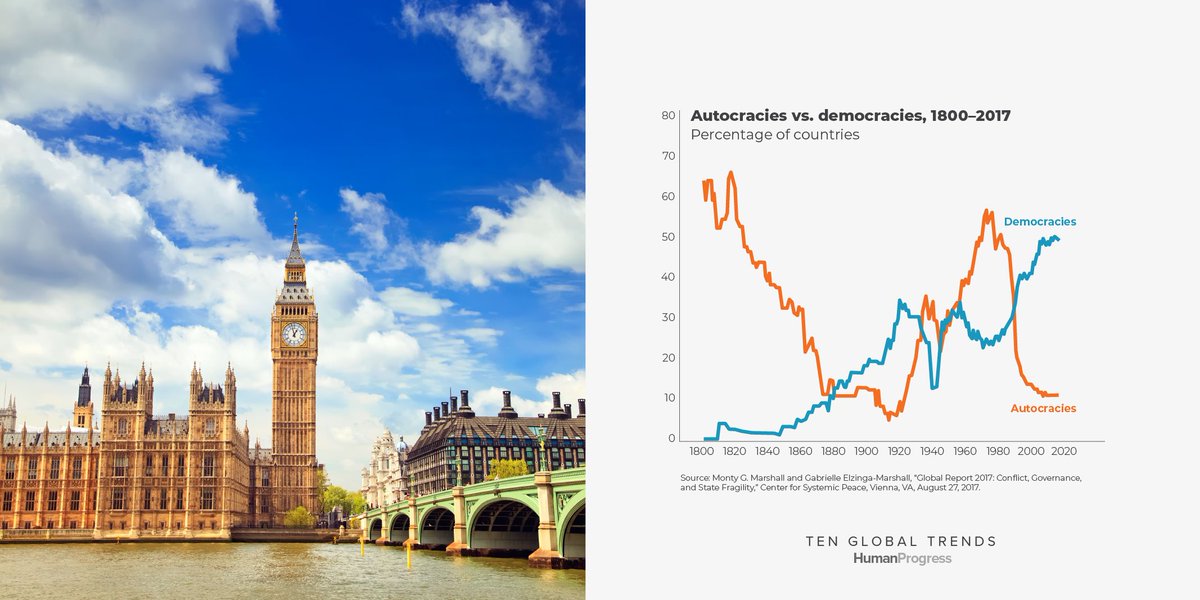
💡Electricity is indispensable for basic activities like lighting and refrigeration.
Since 2012, more than 100 million people per year have gained access to electricity.
Read more about this trend: tenglobaltrends.org
#78DaysOfProgress
(9/78)
Since 2012, more than 100 million people per year have gained access to electricity.
Read more about this trend: tenglobaltrends.org
#78DaysOfProgress
(9/78)
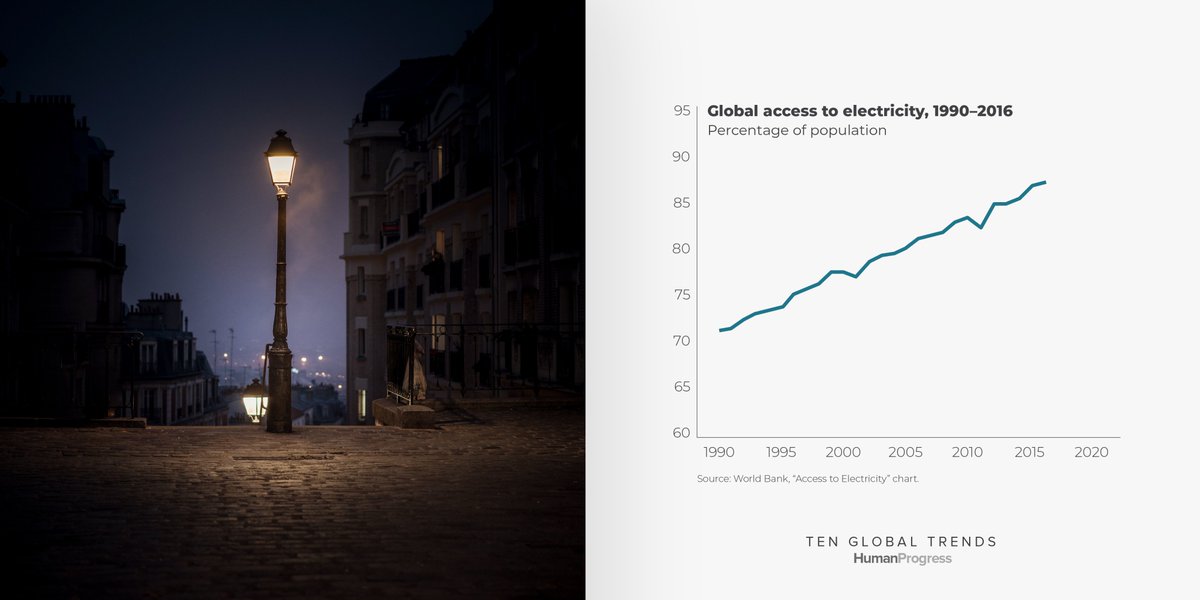
🏳️🌈 Homosexuality was legal in 123 out of the 193 members of the United Nations in 2019.
Some regions still lag behind, but increasing urbanization, education, and wealth will likely make people everywhere more tolerant in the future.
Read more: tenglobaltrends.org
(10/78)
Some regions still lag behind, but increasing urbanization, education, and wealth will likely make people everywhere more tolerant in the future.
Read more: tenglobaltrends.org
(10/78)

🎗️The risk of dying from cancer increases with age.
While more people die of cancer today than in the past, the age-adjusted cancer death rate fell 17% between 1990 and 2016.
Read more: tenglobaltrends.org
#78DaysOfProgress
(11/78)
While more people die of cancer today than in the past, the age-adjusted cancer death rate fell 17% between 1990 and 2016.
Read more: tenglobaltrends.org
#78DaysOfProgress
(11/78)

🌋The chance of a person dying in a natural catastrophe has declined by nearly 99% since the 1920s and 1930s.
Read more about this trend in our book: tenglobaltrends.org
#78DaysOfProgress
(12/78)
Read more about this trend in our book: tenglobaltrends.org
#78DaysOfProgress
(12/78)

🪖Over the past half-century, wars between countries have become rarer.
Interstate warfare has declined as countries have become wealthier, more democratic, and more economically intertwined.
Read more: tenglobaltrends.org
#78DaysOfProgress
(13/78)
Interstate warfare has declined as countries have become wealthier, more democratic, and more economically intertwined.
Read more: tenglobaltrends.org
#78DaysOfProgress
(13/78)

♀️ The gender wage gap is narrowing, reflecting tremendous progress in gender equality.
It's worth noting that after adjusting for job title, education, and experience, the wage gap in many developed nations becomes insignificant.
Read more: tenglobaltrends.org
(14/78)
It's worth noting that after adjusting for job title, education, and experience, the wage gap in many developed nations becomes insignificant.
Read more: tenglobaltrends.org
(14/78)

⛽️Humanity has not yet run out of a single supposedly nonrenewable resource.
In fact, resources tend to become more abundant over time relative to the demand for them.
Learn more about resource abundance and time prices here: humanprogress.org/resources-are-…
#78DaysOfProgress
(15/78)
In fact, resources tend to become more abundant over time relative to the demand for them.
Learn more about resource abundance and time prices here: humanprogress.org/resources-are-…
#78DaysOfProgress
(15/78)

👩🌾 The amount of land devoted to food production may soon begin to fall as population growth slows and agricultural productivity increases.
Researchers predict 146 million hectares will return to nature by 2060.
Read more: tenglobaltrends.org
#78DaysOfProgress
(16/78)
Researchers predict 146 million hectares will return to nature by 2060.
Read more: tenglobaltrends.org
#78DaysOfProgress
(16/78)
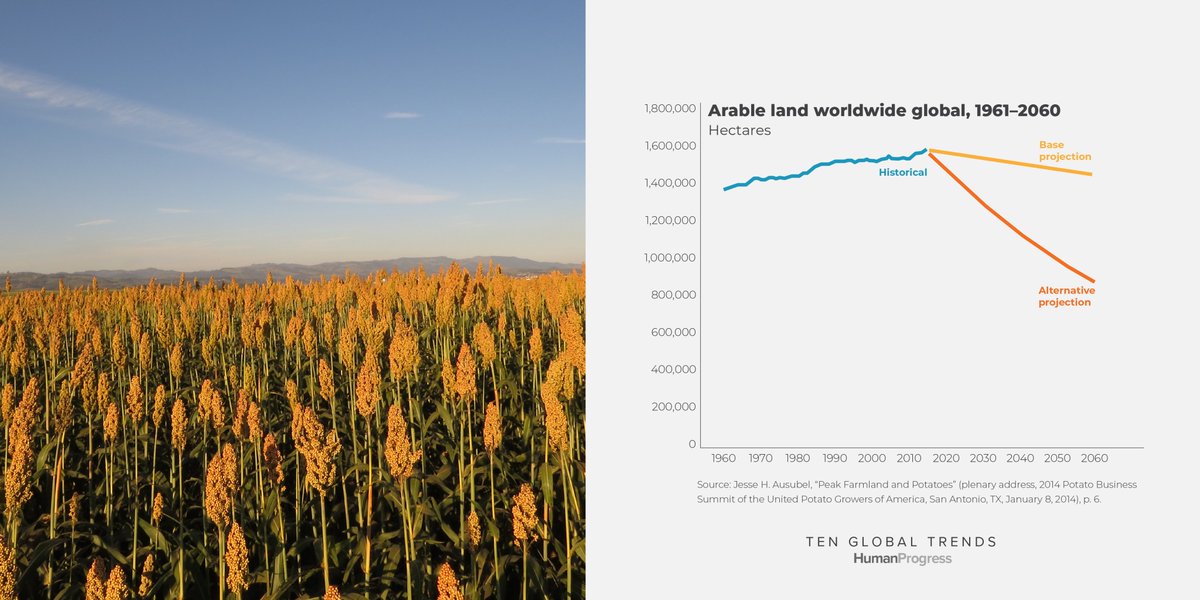
💀In 2018, Amnesty International noted that “106 countries had abolished the death penalty in law for all crimes."
Most executions today take place in China, Iran, Iraq, Saudi Arabia, and Vietnam.
Read more in our book: tenglobaltrends.org
#78DaysOfProgress
(17/78)
Most executions today take place in China, Iran, Iraq, Saudi Arabia, and Vietnam.
Read more in our book: tenglobaltrends.org
#78DaysOfProgress
(17/78)

☁️Air pollution in the U.S. is falling steeply.
The EPA reports that between 1970 and 2018, total emissions of the six principal air pollutants dropped by 74% despite a 275% increase in GDP.
Read more in our book: tenglobaltrends.org
#78DaysOfProgress
(18/78)
The EPA reports that between 1970 and 2018, total emissions of the six principal air pollutants dropped by 74% despite a 275% increase in GDP.
Read more in our book: tenglobaltrends.org
#78DaysOfProgress
(18/78)

✈️ Since the Airline Deregulation Act of 1978, American airfare has plummeted.
According to economist Mark J. Perry, the average round-trip U.S. domestic airfare fell 43% between 1979 and 2017.
Read more: tenglobaltrends.org
#78DaysOfProgress
(19/78)
According to economist Mark J. Perry, the average round-trip U.S. domestic airfare fell 43% between 1979 and 2017.
Read more: tenglobaltrends.org
#78DaysOfProgress
(19/78)

🕊️ While the number of nuclear powers has increased since 1991, the total quantity of warheads has declined.
At the height of the cold war, there were 64,449 nuclear warheads. In 2018, there were 9,305.
Read more: tenglobaltrends.org
#78DaysOfProgresss
(20/78)
At the height of the cold war, there were 64,449 nuclear warheads. In 2018, there were 9,305.
Read more: tenglobaltrends.org
#78DaysOfProgresss
(20/78)

🥘While war and political violence still cause famines, hunger no longer haunts the vast majority of humankind.
The FAO reports that the global prevalence of undernourishment fell to a low of 10.6% in 2015.
Read more: tenglobaltrends.org
#78DaysOfProgress
(21/78)
The FAO reports that the global prevalence of undernourishment fell to a low of 10.6% in 2015.
Read more: tenglobaltrends.org
#78DaysOfProgress
(21/78)

🔨 Simply put, the richer the country, the less people work.
The average annual hours worked per worker in 81 developed countries declined from 2,123 in 1950 to 1,732 in 2017.
Read more: tenglobaltrends.org
#78DaysOfProgress
(22/78)
The average annual hours worked per worker in 81 developed countries declined from 2,123 in 1950 to 1,732 in 2017.
Read more: tenglobaltrends.org
#78DaysOfProgress
(22/78)
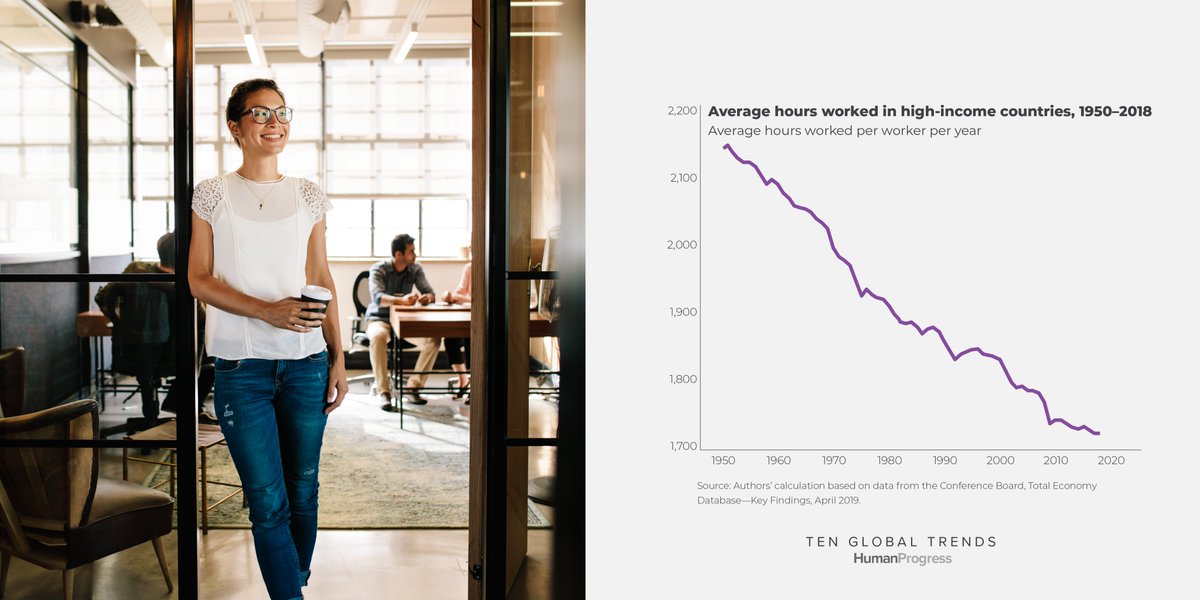
🧒Child labor was once ubiquitous. Today, it is on the decline.
According to the ILO, child laborers as a proportion of all children ages 5 to 17 dropped globally from 16% in 2000 to 9.6% in 2016.
Read more: tenglobaltrends.org
#78DaysOfProgress
(23/78)
According to the ILO, child laborers as a proportion of all children ages 5 to 17 dropped globally from 16% in 2000 to 9.6% in 2016.
Read more: tenglobaltrends.org
#78DaysOfProgress
(23/78)
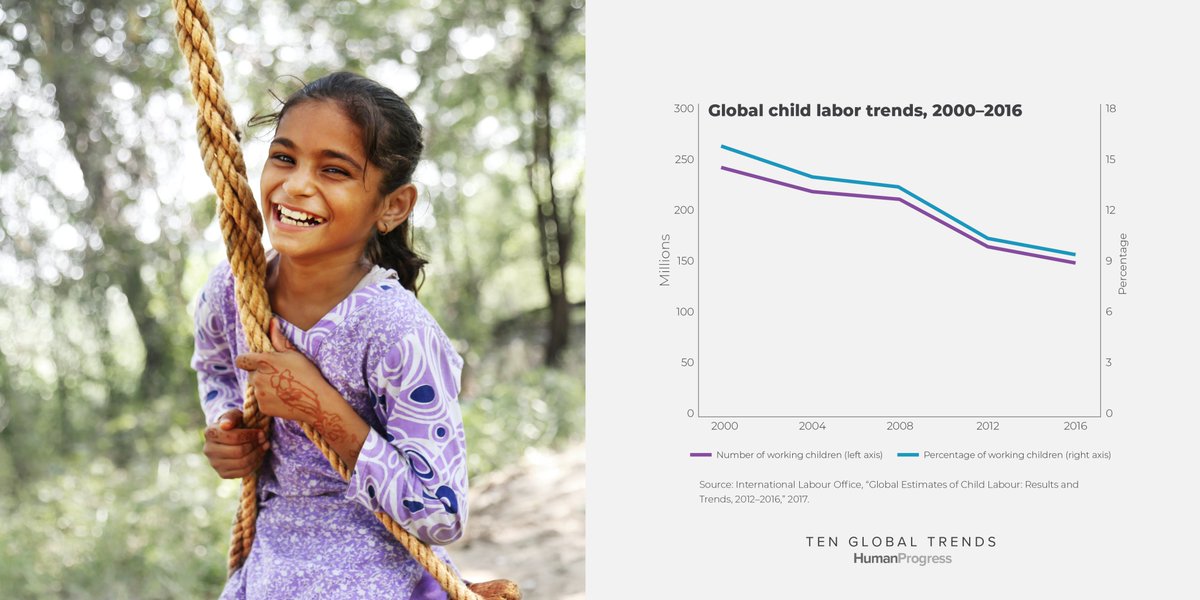
🌾Between 1961 and 2017, world grain production nearly quadrupled.
This increase in production took place even though the amount of land used to cultivate food crops only increased by around 15% in the same period.
Read more: tenglobaltrends.org
#78DaysOfProgress
(24/78)
This increase in production took place even though the amount of land used to cultivate food crops only increased by around 15% in the same period.
Read more: tenglobaltrends.org
#78DaysOfProgress
(24/78)

💧Renewable water reserves per person are declining, so it's important to get the most out of the water we use.
Luckily, some of the world's largest economies are setting a good example for the rest of the world.
Read more: tenglobaltrends.org
#78DaysOfProgress
(25/78)
Luckily, some of the world's largest economies are setting a good example for the rest of the world.
Read more: tenglobaltrends.org
#78DaysOfProgress
(25/78)

💉The world has come a long way since Edward Jenner performed his first smallpox vaccination in 1796.
As of 2018, global vaccination coverage remains at 85%.
Read more: tenglobaltrends.org
#WorldImmunizationWeek
(26/78)
As of 2018, global vaccination coverage remains at 85%.
Read more: tenglobaltrends.org
#WorldImmunizationWeek
(26/78)

🍖 People around the world are eating more protein as they become wealthier.
And meat and dairy aren't as wasteful as people say: 86% of global livestock feed consists of grasses and crop residues that are inedible to humans.
Read more: tenglobaltrends.org
(27/78)
And meat and dairy aren't as wasteful as people say: 86% of global livestock feed consists of grasses and crop residues that are inedible to humans.
Read more: tenglobaltrends.org
(27/78)

📱“Dematerialization” refers to reducing material and energy consumption per unit of GDP.
By making a myriad of older devices obsolete, smartphones can reduce material use by a factor of 300 and power use by a factor of 100.
Read more: tenglobaltrends.org
(28/78)
By making a myriad of older devices obsolete, smartphones can reduce material use by a factor of 300 and power use by a factor of 100.
Read more: tenglobaltrends.org
(28/78)

🧠Over the past century, people have been getting a lot smarter.
In fact, IQ tests are "renormed" every 15-20 years to account for this trend. A person with a score of 100 in 1965 would likely score just 85 points on current tests.
Read more: tenglobaltrends.org
(29/78)
In fact, IQ tests are "renormed" every 15-20 years to account for this trend. A person with a score of 100 in 1965 would likely score just 85 points on current tests.
Read more: tenglobaltrends.org
(29/78)

🏡 In the U.S., houses are getting bigger as households are getting smaller.
As such, the average American's living space nearly doubled between 1973 and 2017.
Read more: tenglobaltrends.org
#78DaysOfProgress
(30/78)
As such, the average American's living space nearly doubled between 1973 and 2017.
Read more: tenglobaltrends.org
#78DaysOfProgress
(30/78)

🚭Because of population growth, the absolute number of daily smokers has continued to rise.
However, the global prevalence of daily smokers fell from 25.1% to 18.6% between 1980 and 2012.
Read more: tenglobaltrends.org
#78DaysOfProgress
(31/78)
However, the global prevalence of daily smokers fell from 25.1% to 18.6% between 1980 and 2012.
Read more: tenglobaltrends.org
#78DaysOfProgress
(31/78)
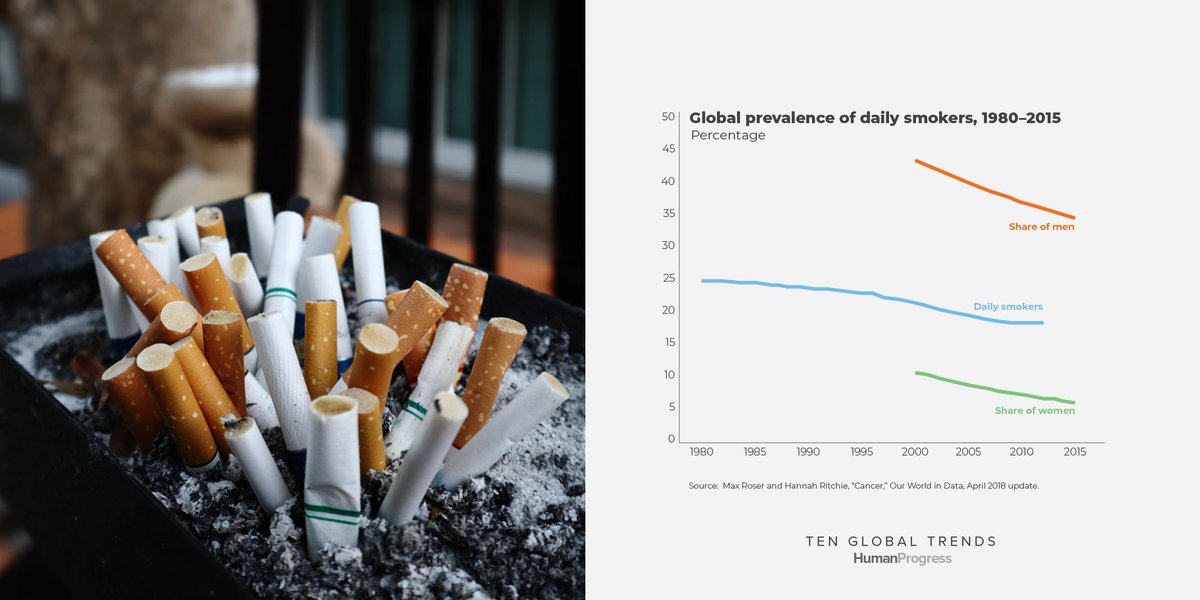
⛽️ In 2000, the Saudi oil minister declared, “the Stone Age came to an end not because we had a lack of stones, and the oil age will come to an end not because we have a lack of oil.”
Indeed, proven crude oil reserves have nearly tripled since 1980.
#78DaysOfProgress
(32/78)
Indeed, proven crude oil reserves have nearly tripled since 1980.
#78DaysOfProgress
(32/78)

📰 No human right is more important than free speech. Without it, no other rights can be asserted and defended.
While the press has become freer since the 1980s, recent setbacks make its future uncertain.
Read more: tenglobaltrends.org
#WorldPressFreedomDay
(33/78)
While the press has become freer since the 1980s, recent setbacks make its future uncertain.
Read more: tenglobaltrends.org
#WorldPressFreedomDay
(33/78)

🌾Thanks to hybridization, nitrogen fertilizer, improved pest controls, and genetically enhanced crops, global cereal yields have more than doubled since 1961.
Read more about this trend in our book: tenglobaltrends.org
#78DaysOfProgress
(34/78)
Read more about this trend in our book: tenglobaltrends.org
#78DaysOfProgress
(34/78)

🎗️Thanks to falling rates of smoking and advances in early detection and treatment, cancer incidence and mortality rates are at a 26-year low in the U.S.
Read more: tenglobaltrends.org
#78DaysOfProgresss
(35/78)
Read more: tenglobaltrends.org
#78DaysOfProgresss
(35/78)

👵During the past 200 years, global life expectancy has more than doubled.
The U.N. estimates that the average life expectancy will be 83 by the end of the century.
Read more: tenglobaltrends.org
#78DaysOfProgress
(36/78)
The U.N. estimates that the average life expectancy will be 83 by the end of the century.
Read more: tenglobaltrends.org
#78DaysOfProgress
(36/78)

⛓️While slavery still plagues the modern world, it has completely lost its legal status.
In 2007, Mauritania became the last country to criminalize enslavement.
Read more: tenglobaltrends.org
#78DaysOfProgress
(37/78)
In 2007, Mauritania became the last country to criminalize enslavement.
Read more: tenglobaltrends.org
#78DaysOfProgress
(37/78)

🪖If military spending had kept pace with economic growth since 1960, the world's nations would have spent $3.2 trillion on their militaries in 2017.
Instead, they spent $1.7 trillion.
Read more: tengobaltrends.org
#78DaysOfProgress
(38/78)
Instead, they spent $1.7 trillion.
Read more: tengobaltrends.org
#78DaysOfProgress
(38/78)

👩🏾🤝👨🏻Back in 1958, only 4% of white Americans were in favor of intermarriage between blacks and whites.
By 2013, 87% of white Americans approved of interracial marriage.
Read more: tenglobaltrends.org
#78DaysOfProgress
(39/78)
By 2013, 87% of white Americans approved of interracial marriage.
Read more: tenglobaltrends.org
#78DaysOfProgress
(39/78)

⚰️It turns out that death itself is in retreat.
Thanks to falling infant mortality rates, the death rates in some less developed countries are lower than the death rates in richer countries with older citizens.
Read more: tenglobaltrends.org
#78DaysOfProgress
(40/78)
Thanks to falling infant mortality rates, the death rates in some less developed countries are lower than the death rates in richer countries with older citizens.
Read more: tenglobaltrends.org
#78DaysOfProgress
(40/78)

🌳Global tree cover increased by 2.24 million square kilometers between 1982 and 2016, according to researchers at the University of Maryland.
Humanity has begun the process of withdrawing from the natural world.
Read more: tenglobaltrends.org
#78DaysOfProgress
(41/78)
Humanity has begun the process of withdrawing from the natural world.
Read more: tenglobaltrends.org
#78DaysOfProgress
(41/78)
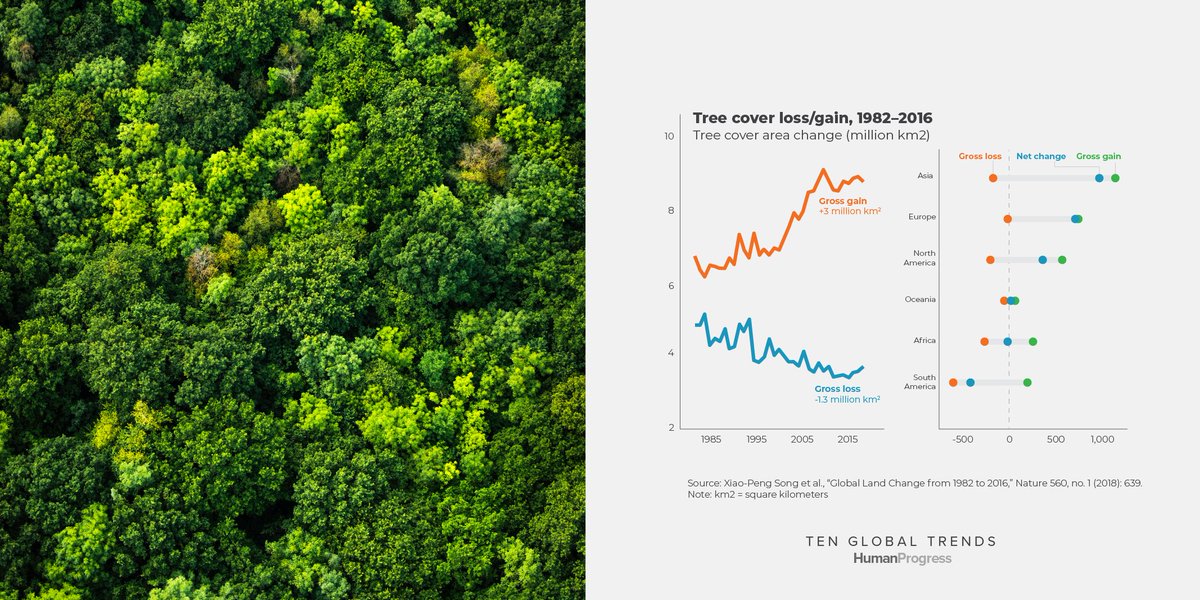
🦟Thanks to new medicines and insecticides, and insecticide-treated bed nets, malaria is on the retreat.
Between 1990 and 2017, the global malaria death rate fell by 35%.
Plus, a vaccine may be on the horizon: bbc.com/news/health-56…
#78DaysOfProgress
(42/78)
Between 1990 and 2017, the global malaria death rate fell by 35%.
Plus, a vaccine may be on the horizon: bbc.com/news/health-56…
#78DaysOfProgress
(42/78)

🧑🎨 As industrialized countries become richer, more people become employed in the service sector.
Most service jobs are physically easier, more intellectually stimulating, better paid, and safer than agricultural or manufacturing jobs.
Read more: tenglobaltrends.org
(43/78)
Most service jobs are physically easier, more intellectually stimulating, better paid, and safer than agricultural or manufacturing jobs.
Read more: tenglobaltrends.org
(43/78)

👷The work-related death rate fell 95% in the U.S. between 1913 & 2015.
Labor union activism is often credited with the decline, but economic expansion is what made better working conditions possible in the first place.
Read more: tenglobaltrends.org
(44/78)
Labor union activism is often credited with the decline, but economic expansion is what made better working conditions possible in the first place.
Read more: tenglobaltrends.org
(44/78)

🫁 The global tuberculosis incidence decreased from 173 per 100,000 people in 2000 to 140 in 2016, a 19% decline.
The global tuberculosis treatment success rate rose from 69% in 2000 to 83% in 2015.
Read more in our book: tenglobaltrends.org
#78DaysOfProgress
(45/78)
The global tuberculosis treatment success rate rose from 69% in 2000 to 83% in 2015.
Read more in our book: tenglobaltrends.org
#78DaysOfProgress
(45/78)

⛽️ Cheap natural gas has now displaced coal as the primary fuel for generating electricity in the United States.
At current production rates, the world’s proven reserves of natural gas would last more than 54 years.
Read more: tenglobaltrends.org
#78DaysOfProgress
(46/78)
At current production rates, the world’s proven reserves of natural gas would last more than 54 years.
Read more: tenglobaltrends.org
#78DaysOfProgress
(46/78)

👩🍼While not necessarily a good thing in itself, the falling birth rate is an indicator of human progress.
The trend reflects falling infant mortality rates and improved economic and social conditions for women.
Read more: tenglobaltrends.org
#78DaysOfProgress
(47/78)
The trend reflects falling infant mortality rates and improved economic and social conditions for women.
Read more: tenglobaltrends.org
#78DaysOfProgress
(47/78)

💹 Over the past 200 years, absolute poverty has gone from the normal state of human existence to a fringe case.
Covid has undone some of this progress, but poverty will likely continue to decline in the future.
Read more: tenglobaltrends.org
#78DaysOfProgress
(48/78)
Covid has undone some of this progress, but poverty will likely continue to decline in the future.
Read more: tenglobaltrends.org
#78DaysOfProgress
(48/78)

🎗️Humanity is winning the war on AIDS.
The HIV pandemic peaked in the mid-2000s when some 1.9 million people died of AIDS each year.
In 2017, fewer than 1 million died from the sickness.
Read more: tenglobaltrends.org
#78DaysOfProgress
(49/78)
The HIV pandemic peaked in the mid-2000s when some 1.9 million people died of AIDS each year.
In 2017, fewer than 1 million died from the sickness.
Read more: tenglobaltrends.org
#78DaysOfProgress
(49/78)

🐟Aquaculture is growing to meet the world's rising demand for fish.
With wild fish capture at unsustainable levels, the growth of aquaculture is a welcome development.
Read more: tenglobaltrends.org
#78DaysOfProgress
(50/78)
With wild fish capture at unsustainable levels, the growth of aquaculture is a welcome development.
Read more: tenglobaltrends.org
#78DaysOfProgress
(50/78)

👩⚖️Women account for half of the world’s population, yet they have held political power only infrequently.
That began to change at the end of the 19th century as a consequence of the Enlightenment.
Read more: tenglobaltrends.org
#78DaysOfProogress
(51/78)
That began to change at the end of the 19th century as a consequence of the Enlightenment.
Read more: tenglobaltrends.org
#78DaysOfProogress
(51/78)

🏚️In 1990, 47% of the world’s urban population lived in slums. That figure fell to 30% by 2014.
In the long run, rising incomes enable people in poor countries to move from slums into proper dwellings.
Read more: tenglobaltrends.org
#78DaysOfProogress
(52/78)
In the long run, rising incomes enable people in poor countries to move from slums into proper dwellings.
Read more: tenglobaltrends.org
#78DaysOfProogress
(52/78)

The Human Development Index (HDI) takes into account a country's average life expectancy, education level, and income.
The HDI for the world as a whole increased from 0.598 in 1990 to 0.728 in 2017
Read more: tenglobaltrends.org
#78DaysOfProogress
(53/78)
The HDI for the world as a whole increased from 0.598 in 1990 to 0.728 in 2017
Read more: tenglobaltrends.org
#78DaysOfProogress
(53/78)

🥘For most of history, food was always scarce. But the past century has seen a steady rise in food supply worldwide.
In 2017, the average food supply in Sub-Saharan Africa reached 2,449 calories per person per day.
Read more: tenglobaltrends.org
#78DaysOfProgress
(54/78)
In 2017, the average food supply in Sub-Saharan Africa reached 2,449 calories per person per day.
Read more: tenglobaltrends.org
#78DaysOfProgress
(54/78)

📗In 1820, nearly 90% of the world’s population was illiterate. Today, almost 90% can read.
Literacy is associated with lower poverty & mortality rates and greater gender equality & political participation.
Read more: tenglobaltrends.org
#78DaysOfProgress
(55/78)
Literacy is associated with lower poverty & mortality rates and greater gender equality & political participation.
Read more: tenglobaltrends.org
#78DaysOfProgress
(55/78)

😀People around the world are generally becoming happier.
Recent research has shown that as countries get richer, their people become happier. Money may not buy happiness, but the two do correlate.
Read more: tenglobaltrends.org
#78DaysOfProgress
(56/78)
Recent research has shown that as countries get richer, their people become happier. Money may not buy happiness, but the two do correlate.
Read more: tenglobaltrends.org
#78DaysOfProgress
(56/78)
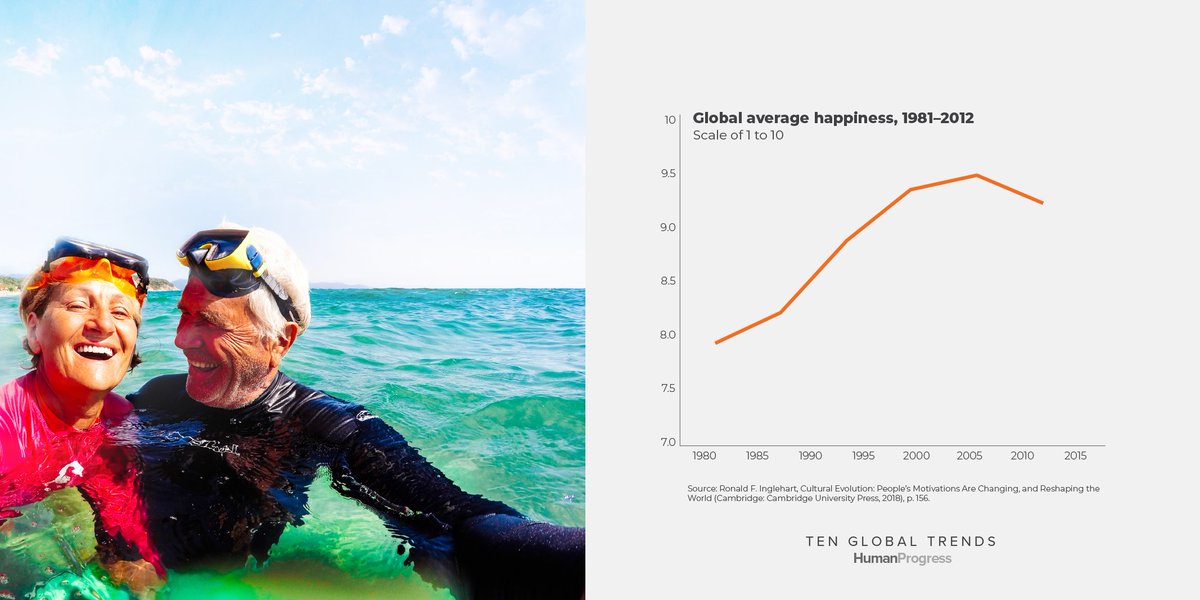
🕯️William Nordhaus estimates that our Paleolithic ancestors had to work for 58 hours to create 1,000 lumen-hours of light.
In 1800, it took 5.4 hours, in 1900, 13 minutes, and by 1992, just half a second of labor.
Read more: tenglobaltrends.org
#78DaysOfProgress
(57/78)
In 1800, it took 5.4 hours, in 1900, 13 minutes, and by 1992, just half a second of labor.
Read more: tenglobaltrends.org
#78DaysOfProgress
(57/78)

🌎Global population will likely peak at 9.8 billion around 2080 and fall to 9.5 billion by 2100.
The trend is not necessarily a good thing in itself, but it reflects better healthcare and increasing wealth & personal freedom.
Read more: tenglobaltrends.org
(58/78)
The trend is not necessarily a good thing in itself, but it reflects better healthcare and increasing wealth & personal freedom.
Read more: tenglobaltrends.org
(58/78)

🚰 Between 1990 and 2015, access to improved water sources rose from 76% of the world’s population to 91%.
That amounts to 2.6 billion people, or over a third of the world’s population.
Read more: tenglobaltrends.org
#78DaysOfProgress
(59/78)
That amounts to 2.6 billion people, or over a third of the world’s population.
Read more: tenglobaltrends.org
#78DaysOfProgress
(59/78)

💹Over the 1800 years that separated Jesus and Thomas Jefferson, incomes rose by about 40%.
Between 1800 and 1900, GDP per person nearly doubled.
Between 1900 and 2016, GDP per capita increased by 621%.
Read more: tenglobaltrends.org
#78DaysOfProgress
(60/78)
Between 1800 and 1900, GDP per person nearly doubled.
Between 1900 and 2016, GDP per capita increased by 621%.
Read more: tenglobaltrends.org
#78DaysOfProgress
(60/78)

☀️The average price of solar cells fell 95% between 1977 and 2008.
Bloomberg analysts project that thanks to falling costs, wind and solar technologies will generate half the world's electricity by 2050.
Read more: tenglobaltrends.org
#78DaysOfProgress
(61/78)
Bloomberg analysts project that thanks to falling costs, wind and solar technologies will generate half the world's electricity by 2050.
Read more: tenglobaltrends.org
#78DaysOfProgress
(61/78)
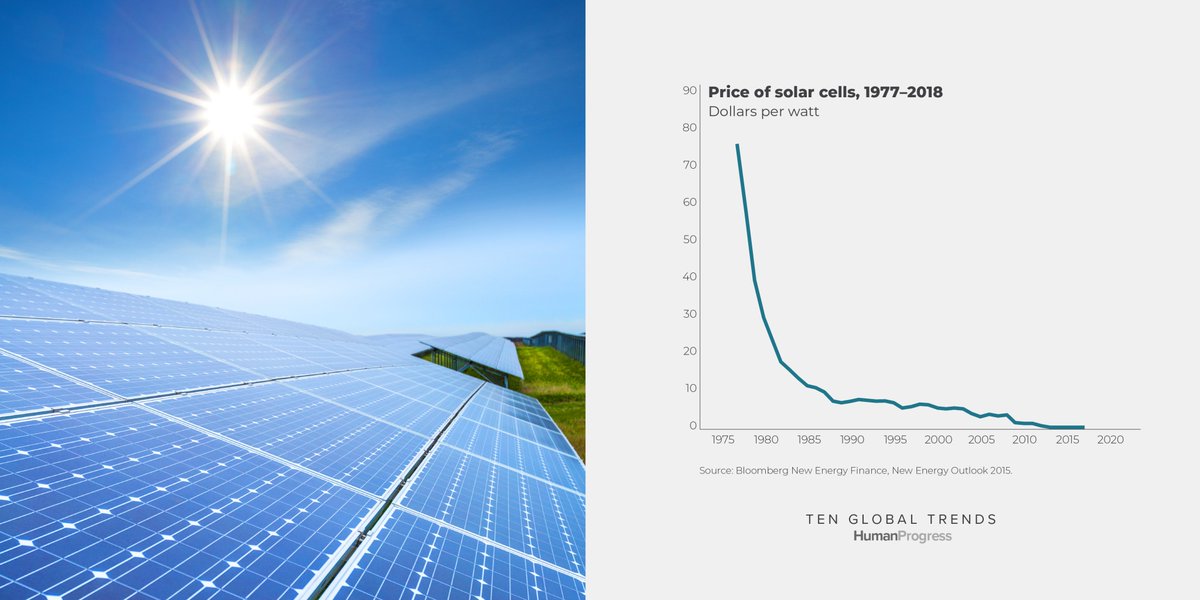
🎒 Rising incomes across the globe have liberated increasing numbers of children from fields and factories.
Primary, secondary, and tertiary school enrollment rates have all risen since 1970.
Read more: tenglobaltrends.org
#78DaysOfProgress
(62/78)
Primary, secondary, and tertiary school enrollment rates have all risen since 1970.
Read more: tenglobaltrends.org
#78DaysOfProgress
(62/78)
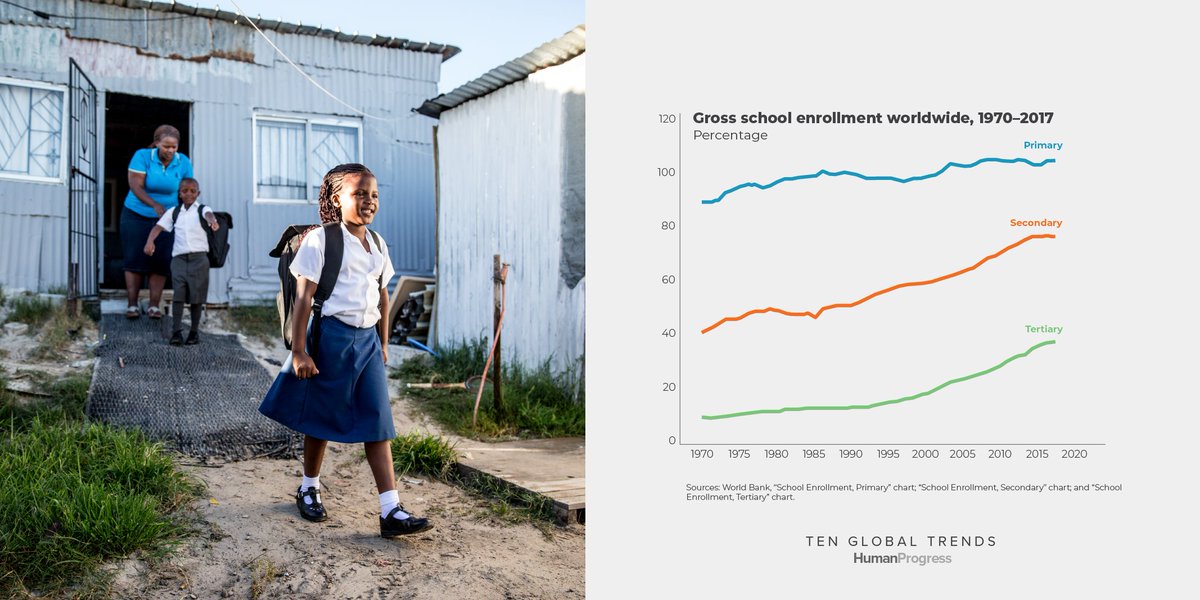
🚽The need to separate ourselves from our own waste may seem obvious to most people today, but for millennia that was not the case.
Today, poor sanitation is mostly limited to very poor countries.
Read more: tenglobaltrends.org
#78DaysOfProgress
(63/78)
Today, poor sanitation is mostly limited to very poor countries.
Read more: tenglobaltrends.org
#78DaysOfProgress
(63/78)

🪦"One can never use the word ‘fortunately’ in connection with the killing of innocents, but the numbers [of civilians killed] in the 21st century are a fraction of those in earlier decades." – @sapinker
Read more: tenglobaltrends.org
#78DaysOfProgress
(64/78)
Read more: tenglobaltrends.org
#78DaysOfProgress
(64/78)

@sapinker 💉Vaccines are among the most effective healthcare innovations ever devised.
Over the past century, vaccines have prevented 3-4 million American deaths and greatly reduced hospitalization & human suffering.
Read more: tenglobaltrends.org
#78DaysOfProgress
(65/78)
Over the past century, vaccines have prevented 3-4 million American deaths and greatly reduced hospitalization & human suffering.
Read more: tenglobaltrends.org
#78DaysOfProgress
(65/78)

@sapinker 📘As late as 1870, the average length of schooling for people between 25 and 64 is estimated to have been about 0.5 years.
By 2010, the average length of schooling
at all levels of education stood at 8.56 years.
Read more: tenglobaltrends.org
#78DaysOfProgress
(66/78)
By 2010, the average length of schooling
at all levels of education stood at 8.56 years.
Read more: tenglobaltrends.org
#78DaysOfProgress
(66/78)

@sapinker 👩👧The global maternal mortality rate fell 44% from 1990 to 2015.
In Sub-Saharan Africa, the world’s poorest region, the number of maternal deaths fell 45% over the same period.
Read more: tenglobaltrends.org
#78DaysOfProgress
(67/78)
In Sub-Saharan Africa, the world’s poorest region, the number of maternal deaths fell 45% over the same period.
Read more: tenglobaltrends.org
#78DaysOfProgress
(67/78)

🪖 The proportion of men and women at arms declined by 27% globally between 1990 and 2016.
The largest decline —from 5.5% to 2.3%— took place in the Middle East & North Africa.
Read more: tenglobaltrends.org
#78DaysOfProgress
(68/78)
The largest decline —from 5.5% to 2.3%— took place in the Middle East & North Africa.
Read more: tenglobaltrends.org
#78DaysOfProgress
(68/78)

🌊 Countries began formally setting aside landscapes as protected parks and nature preserves in the late 19th century.
Today, over 7% of the ocean and 15% of the earth’s land is now protected.
Read more: tenglobaltrends.org
#WorldOceansDay
(69/78)
Today, over 7% of the ocean and 15% of the earth’s land is now protected.
Read more: tenglobaltrends.org
#WorldOceansDay
(69/78)

💾 In 1980, a gigabyte of storage would have cost nearly one million 2018 dollars.
By 2018, a gigabyte of storage cost just $0.019. That’s a decline of more than 99.99%.
Read more: tenglobaltrends.org
#78DaysOfProgress
(70/78)
By 2018, a gigabyte of storage cost just $0.019. That’s a decline of more than 99.99%.
Read more: tenglobaltrends.org
#78DaysOfProgress
(70/78)

✈️ Travel for pleasure is modern. It was popularized, at least in Europe, by 17th-century noblemen.
Today, a luxury once reserved for a tiny sliver of society is available to an increasing number of people worldwide.
Read more: tenglobaltrends.org
#78DaysOfProgress
(71/78)
Today, a luxury once reserved for a tiny sliver of society is available to an increasing number of people worldwide.
Read more: tenglobaltrends.org
#78DaysOfProgress
(71/78)

📶The internet is one of the greatest inventions of all time. It democratizes knowledge and enables easy communication.
And internet use is rapidly growing. As of 2016, 46% of the world had access to the internet.
Read more: tenglobaltrends.org
#78DaysOfProgress
(72/78)
And internet use is rapidly growing. As of 2016, 46% of the world had access to the internet.
Read more: tenglobaltrends.org
#78DaysOfProgress
(72/78)

🗡️ The U.S. violent crime rate—including rape, robbery, and assault—peaked at 758.2 crimes per 100,000 residents in 1991.
By 2018, that rate had fallen about 50%, down to 368.9 per 100,000 persons.
Read more: tenglobaltrends.org
#78DaysOfProgress
(73/78)
By 2018, that rate had fallen about 50%, down to 368.9 per 100,000 persons.
Read more: tenglobaltrends.org
#78DaysOfProgress
(73/78)

🤝"There is overwhelming evidence that trade openness is a more trustworthy friend of the poor than protectionism." – @APanagariya
Between 1988 and 2017, the average applied tariff rate on all products declined 46%.
Read more: tenglobaltrends.org
#78DaysOfProgress
(74/78)
Between 1988 and 2017, the average applied tariff rate on all products declined 46%.
Read more: tenglobaltrends.org
#78DaysOfProgress
(74/78)

📱The landline phone never reached more than 21.4% of the world's population.
By adopting cellular technology, developing countries were able to leapfrog that economic bottleneck.
Read more: tenglobaltrends.org
#78DaysOfProgress
(75/78)
By adopting cellular technology, developing countries were able to leapfrog that economic bottleneck.
Read more: tenglobaltrends.org
#78DaysOfProgress
(75/78)

🛍️American households spend an ever-smaller share of their incomes on the basic necessities: food, clothing, and housing.
In 2018, household outlays on food were at 12.9%, clothing at 3%, and housing at 32.8%.
Read more: tenglobaltrends.org
#78DaysOfProgress
(76/78)
In 2018, household outlays on food were at 12.9%, clothing at 3%, and housing at 32.8%.
Read more: tenglobaltrends.org
#78DaysOfProgress
(76/78)

📻 The speed of technology adoption is increasing.
It took about a half-century for the telephone to spread into 50% of U.S. households.
It took only 12 years for 50% of individual Americans to own a smartphone.
Read more: tenglobaltrends.org
#78DaysOfProgress
(77/78)
It took about a half-century for the telephone to spread into 50% of U.S. households.
It took only 12 years for 50% of individual Americans to own a smartphone.
Read more: tenglobaltrends.org
#78DaysOfProgress
(77/78)
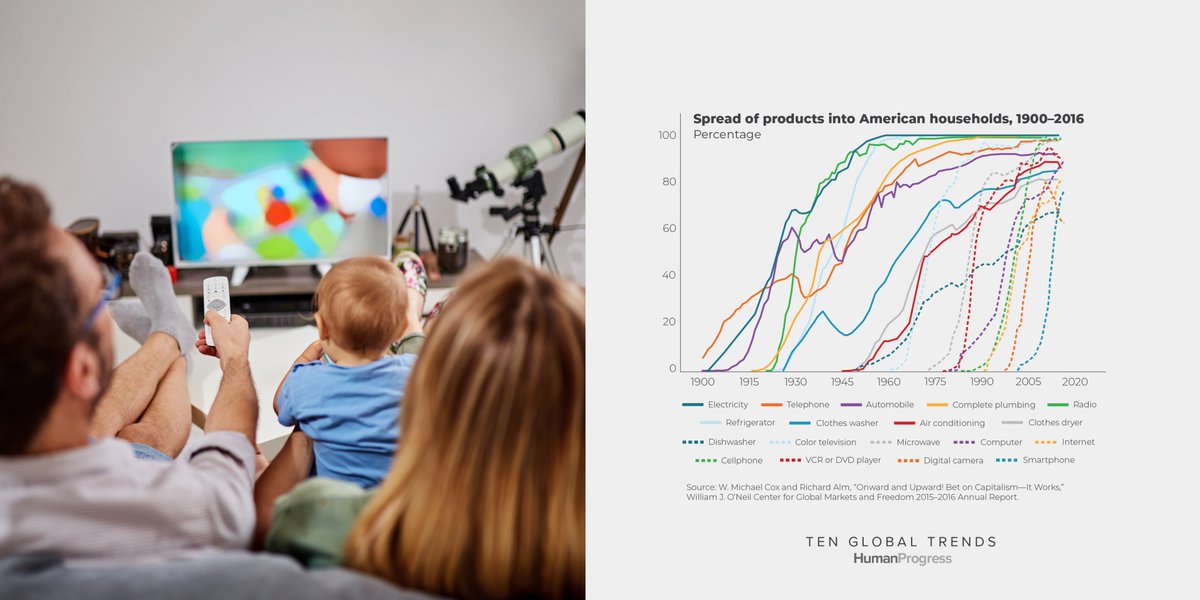
🌍Over the past 200 years, the world's economy has grown more than a hundredfold.
This trend, known as the "Great Enrichment," is what made our progress possible.
Read about all these trends in our book: tenglobaltrends.org
#78DaysOfProgress
(78/78)
This trend, known as the "Great Enrichment," is what made our progress possible.
Read about all these trends in our book: tenglobaltrends.org
#78DaysOfProgress
(78/78)

• • •
Missing some Tweet in this thread? You can try to
force a refresh


